The implementation of the Russian government’s ambitious plan to upgrade its national fishery fleet through an investment-quota incentive program – which ties quota allocations to investments in new ships at Russian shipyards – is likely going to be delayed, as companies in the country aren’t capable of constructing the vessels in timeframe outlined in the program's bylaws.
The incentive program was launched by the government in 2016, and allocates additional quotas for some species to certain companies, if those companies have a ship of certain specifications built at a Russian shipyard within six years. The additional quota is given to the company for 15 years, but only upon the commissioning of the vessel.
The initiative has been the main tool in the government’s effort to bring its national fishery fleet back to life. Since 2000, the number of commercial fishing vessels operating in Russia has declined by 25 percent. At the moment, Russia-based fishing companies own more than 1,500 vessels over 80 metric tons (MT) in weight and with an engine of more than 55 kWe, but only 1,000 of them are in operation. Plus, the average age of the vessels exceeds 28 years, with many being far older.
Besides the upgrades to the fleet, the quota incentives were also aimed at boosting Russia’s shipbuilding industry by providing them with new orders. Over the years, Russian producers have been focusing primarily on military ships, while much of the country’s cargo and fishery fleet was imported.
The investment quotas program has proven to be successful. A few application campaigns have brought 43 contracts for building vessels, in total worth RUB 187 billion (USD 2.64 billion, EUR 2.40 billion). All of the contracted ships are to be outfitted with modern technologies and equipment, and two vessels have already been built, and another nine have been floated out, according to the Russian Federal Agency for Fisheries (Rosrybolovstvo).
Keels of all the remaining vessels are to be laid down through the end of 2021, with floating out scheduled for no later than the end of 2025. Of those, 39 of the ships are being, or are going to be, built at shipyards of the state-owned United Shipbuilding Corporation (USC).
However, the plan seems to have failed to gain traction from the start. In late 2019, it came into light that shipyards are struggling to ensure delivery times. The problem proved to be so serious that it surfaced to the attention of the Federation Council, the Upper Chamber of the Russian Parliament (Senate), and multiple government bodies – including the Fishery Agency and the Ministry of Production and Trade.
According to Sergey Mitin, first deputy chairman of the Committee on Agriculture and Food Policy of the Federation Council, in 2019, four vessel-building contracts had delivery times postponed. In 2020, at least another seven contracts will be changed in the same way, and in 2021, five more contracts will be prolonged.
Current legislation provides for a possibility to postpone the commissioning of the vessel for up to one year on a notification basis, or more than a year after the approval of the Fishery Agency. In any case, the vessel must be built within six years since the signing of the investment quota contract between the government and the fishery.
Andrey Zdetovetskiy, minister of fisheries of the Kamchatka region, echoed the concerns of one of the regions’ biggest fisheries, RK Lenina, during a recent commission meeting. A shipyard proposed to revise a contract for the construction of four vessels worth RUB 8 billion (USD 113 million, EUR 102 million). The shipyard wants more money, without any changes to the vessel, harming the relationships between the shipbuilders and the fishing companies.
Sergey Nesvetov, executive director of the North West Fishery Consortium, said during public hearings at the Senate’s committee that his company has faced significant delays. The company currently has four ships laid down. The first was due to be ready in June 2019, but that didn’t happen. The delivery time was extended to May 2020, and it’s now clear that the ship will not be finished on time once again.
The company is facing the same situation with its second ship, which was due to be commissioned in February 2020.
“We will definitely fail to meet the investment quota contract requirements,” he warned. Right now, the delay is more than a year with all four orders.
There is a consensus in the fishing industry that the problem is on the part of the builders, as the fisheries have paid on time, and sometimes even in advance, to keep things moving.
No instant remedy
Russian Federal Agency for Fisheries Head Ilya Shestakov told the media that the agency has joined forces with the USC and the Ministry of Industry and Trade to tackle the problem.
“We just don’t have any choice but to resolve it,” he said.
However, there seems to be no quick solution to the delays, as it is the result of a number of factors.
In Sergey Mitin’s opinion, Russian producers are not ready to quickly and efficiently fulfill the orders from the fisheries due to a lack of knowledge, experience, and capabilities. The companies don’t have their own design engineering bureaus, which necessitates buying technical solutions and equipment from foreign companies.
Another issue is the government’s requirements regarding localization. At least 30 percent of equipment and materials must be of Russian origin, and that creates additional challenges and bottlenecks. Lack of qualified and experienced staff is also contributing to the delays.
In an op-ed published by the Fishnews media agency, Sergey Nesvetov shared similar concerns.
“Problems the shipyards have faced are partially caused by a lack of experience and the overestimation of their strengths. Today, many directors of shipyards confess that they had not understood the complexity of the projects,” he wrote.
However, the lion’s share of blame must be placed on the financial state of the producers, Nesvetov pointed out. The companies don’t have enough funds to be prepared to fulfill new orders.
USC Vice President Vasiliy Boitsov acknowledged the complexity of the program was significantly underestimated by all the sides involved. USC's financial problems, due to its highly leveraged position, are also factoring into the delays, he said.
Industry players expressed a high divergence in views over actions that can be taken to alleviate the challenge. In Nesvetov’s opinion, it’s time for the government to step in. It could help the shipbuilders with funds to get them on a fast track to renovate capacity and tackle labor shortages. Nesvetov also called for the revision of contracts to allow the lengthening of delivery times so that the fishing companies won't be punished for a breach of the contracts.
Valentin Balashov, chairman of the Association of Coastal Fisheries of The Northern Fishery Basin, called for compensation of fishing companies’ losses caused by the delays. The companies took costly bank loans to pay for the investment quotas and new vessels, he said. At the same time, the lengthening of delivery times means that use of the quotas will start later than planned, resulting in later payback and thus additional financial pressure. As compensation, he proposed extending the quota allocations to 20 years.
No matter which tools the Ministry of Industry and Trade, together with shipbuilders, will use, it needs to be sooner rather than later.
In March, Federation Council Speaker Valentina Matvienko, the third-ranked official in the country, invited USC CEO Alexey Rakhmanov to answer questions before the council. Rakhmanov, she said, must come not just for answers to senators’ questions, but with solutions to the problem. The hour was scheduled for late April, but was postponed because of the outbreak of the coronavirus – another cause of delays which cast a shadow over Russian shipbuilders.
Photo courtesy of Russian Fishery Company







